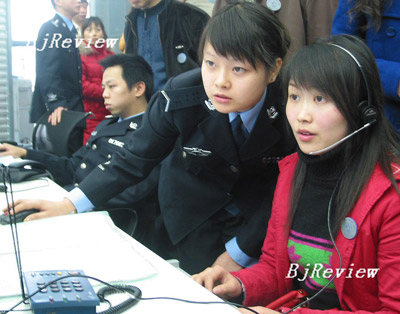
Full Rescue Mission in Nigeria
China has urged the safe release of five Chinese workers who were kidnapped in south Nigeria’s River State on January 5.
The technical workers on a rural telecom project in the African country were abducted by a gang of unidentified armed men. Equipment worth thousands of U.S. dollars was also taken away by the robbers.
China’s Foreign Ministry and local embassy and consulate were ordered by top leaders to do everything possible in rescuing the hostages, and an emergency crew was soon sent from China to assist local police with their search investigations.
At a meeting with Chinese Ambassador Xu Jianguo, Nigerian President Olusegun Obasanjo vowed to make every effort to “solve the problem,” assuring a secure release of the Chinese workers.
All-out Fight Against Corruption
Chinese President Hu Jintao on January 9 pledged a more severe and systematic crackdown on corruption in a keynote speech delivered at a Party conference.
Hu, who is also General Secretary of the Central Committee of the Communist Party of China (CPC), made the call at the Seventh Plenary Session of the CPC Central Commission for Discipline Inspection (CCDI).
Acknowledging the progress the commission had made in the past year, Hu said the Party still faced an “arduous fight against corruption.”
Hu told senior Party officials and the 110 CCDI members attending the session that they should continue to work on investigating “major and high-level corruption cases” and sternly punish crooked officials.
China’s anti-graft fight last year led to the dismissal of several senior officials, including Shanghai ex-party chief Chen Liangyu, former Beijing Vice Mayor Liu Zhihua, and former top statistician Qiu Xiaohua.
Melting Glaciers Not Cool
A new report from the China Geological Survey Bureau says glaciers on China’s Qingzang Gaoyuan Plateau (often referred to as “the roof of the world”), have been shrinking at the alarming rate of 131.4 square km annually for the past three decades.
That is equivalent to an area twice the size of downtown Beijing disappearing every year.
A further 13,000 square km of glacier-nearly 28 percent of the total glacier area-will disappear by 2050 if no protective measures are taken, the report said.
Glaciers on the outskirts of the plateau have already decreased by 10 percent and those in the hinterland have shrunk by 5 percent.
Experts point out that since the plateau supplies the headstreams of many of the major rivers in East, Southeast and South Asia, the region’s water storage drop-off will have a significant impact on the economic and social development of China as well as neighboring countries.
Bad Weather Spells Bad News
Floods claimed 1,841 lives and inflicted direct economic losses of 127.3 billion yuan in China in 2006, according to a Ministry of Water Resources statement on January 6.
Speaking at a national conference in north China’s Hebei Province, Wang Shucheng, Minister of Water Resources, said China suffered an abnormal climate and frequent extreme weather last year.
In 2006, seven typhoons swept southeast China and frequent landslides hit the southern provinces. Severe drought, which fried Chongqing Municipality and Sichuan Province, caused a substantial production drop for farmland making up 14.6 million hectares and drinking water insufficiency for a population of 36.5 million throughout China.
Extreme weather in 2006 caused the most severe damage, reflected in the indexes of affected farmland, affected population, affected cattle, death tolls and direct economic losses, since 1998, when severe flooding devastated the country, according to Wang.
| 